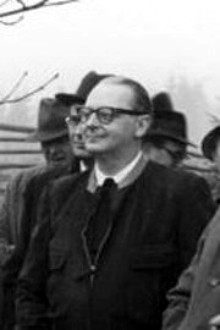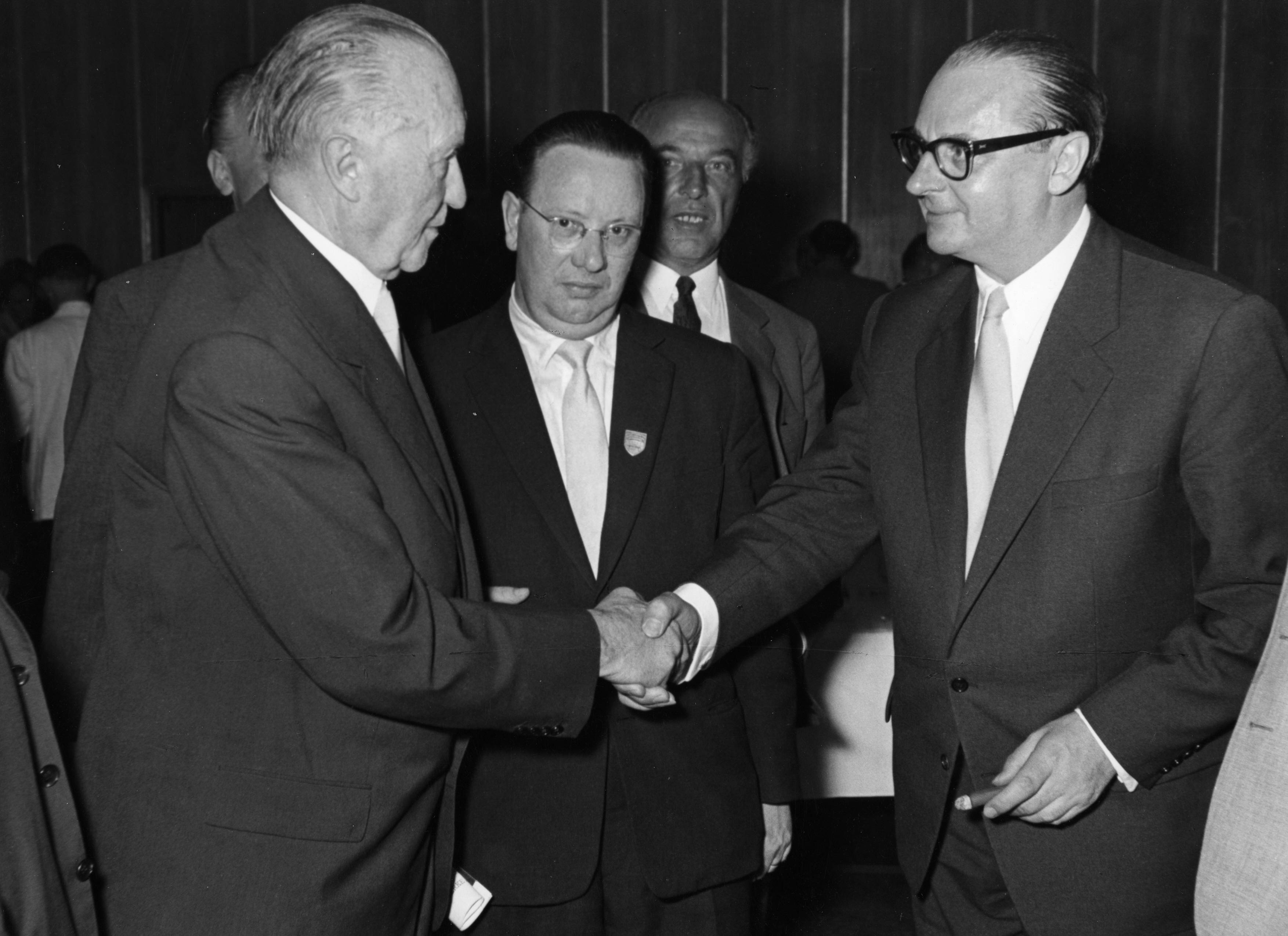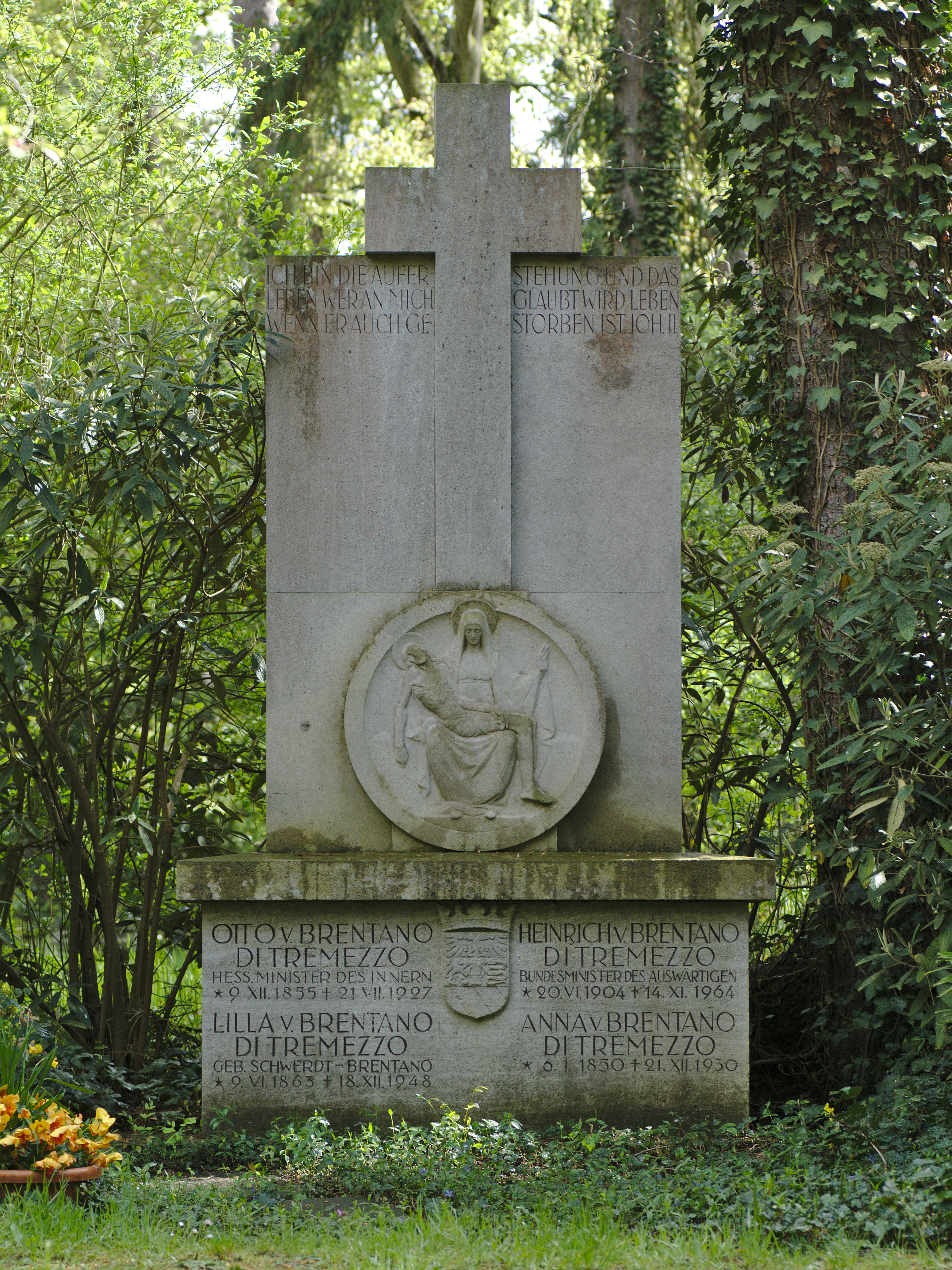1. Early Life and Background
Heinrich von Brentano's early life was shaped by his distinguished family background and a rigorous legal education, which prepared him for a career in public service.
1.1. Birth and Family
Heinrich von Brentano was born on 20 June 1904, in Offenbach am Main, Germany. He was the son of Otto von Brentano, a notable politician from the Centre Party who served as a member of the 1919 Weimar National Assembly. The Brentano family, originally of Lombard (Italian) descent, established themselves in the Landgraviate of Hesse-Darmstadt in the 17th century and were recognized as Hessian nobles. The family maintained close ties with prominent figures of German Romanticism, including Johann Wolfgang von Goethe, Friedrich Carl von Savigny, and Achim von Arnim. Heinrich von Brentano was related to renowned German poets such as Clemens Brentano (1778-1842) and Bettina von Arnim (1785-1859). The author Bernard von Brentano (1901-1964) was his elder brother.
1.2. Education and Early Career
After completing his AbiturGerman degree in 1922, Heinrich von Brentano pursued jurisprudence at the University of Munich. During his studies, he was a member of a Catholic student association. He successfully passed his first StaatsexamenGerman (state examination) in 1925 and his second in 1929. In 1930, he earned his doctorate in law from the University of Giessen. His professional career began in 1932 when he started working as a lawyer at the higher court in Darmstadt. From 1943 to 1945, he served as a public prosecutor in Hanau. Following World War II, from 1945 onward, he also worked as a notary and lawyer.
2. Political Career
Brentano's political career began in the immediate aftermath of World War II, where he rapidly ascended to become a leading figure in West German politics, particularly in the formation of the new federal republic and its integration into Europe.

2.1. Founding the Christian Democratic Union and State Parliament Activities
In 1945, immediately after World War II, Heinrich von Brentano became one of the co-founders of the Christian Democratic Union (CDU) in the state of Hesse. His efforts were instrumental in establishing the party's presence in the region. In 1946, he was elected as a member of the Hesse Landtag, the state parliament, serving until 1949. Within the Landtag, his leadership was quickly recognized, leading to his appointment as the chairman of the CDU parliamentary group in 1947. He also held the position of vice-chairman of the parliamentary occupation status committee from 1948 to 1949. Furthermore, Brentano played a crucial role in the foundational stages of the new West German state by attending the proceedings of the Parlamentarischer RatGerman assembly, which was responsible for drafting the Basic Law for the Federal Republic of Germany, the constitution of the newly formed republic.
2.2. Federal Parliament Activities
In the first federal elections of 1949, Heinrich von Brentano successfully secured a seat in the West German Bundestag (federal parliament) by directly winning the mandate for the Bergstraße constituency. He maintained his seat in the Bundestag until his death in 1964. Concurrent with his initial election, Brentano was appointed chairman of the CDU/CSU parliamentary group, a position he held from 1949 to 1955. His leadership of the parliamentary group was instrumental in shaping the early policies of the Konrad Adenauer government. After his tenure as Foreign Minister, he returned to this role, serving as chairman of the CDU/CSU faction again from 1961 until his death. In 1952, Brentano was among the CDU members of parliament who advocated for the implementation of a plurality voting system (also known as first-past-the-post) instead of the existing mixed-member proportional representation concept, though this reform effort was ultimately unsuccessful.

2.3. Role in European Integration
Heinrich von Brentano was a staunch advocate for European integration, recognizing its importance for post-war stability and prosperity. He was an active member of the European Movement Germany, which promoted the idea of a united Europe. From 1950 to 1955, he served concurrently as both a member and vice-chairman of the Parliamentary Assembly of the Council of Europe. His commitment to European unity deepened with his involvement in the European Common Assembly, where he served as a member from July 1952 until his appointment as Foreign Minister in 1955.
As a dedicated internationalist, Brentano was an important figure in the foundational efforts leading to the establishment of the European Economic Community (EEC). Notably, from 1952 to 1953, he chaired the committee responsible for drafting a constitution for a European Federation under the Schuman Plan, which was a precursor to the European Common Market involving six European countries. His extensive participation in these institutions and initiatives underscores his significant contributions to the political and economic integration of Europe.
2.4. Federal Minister of Foreign Affairs
In June 1955, following the lifting of the Allied occupation statute and West Germany's regained diplomatic sovereignty and accession to NATO, Heinrich von Brentano was appointed Federal Minister for Foreign Affairs. This appointment came at the suggestion of Chancellor Konrad Adenauer, who had previously held the office himself. During his tenure as Foreign Minister from 1955 to 1961, Brentano pursued a foreign policy that strongly emphasized cooperation with France. He also consistently promoted a firm anti-Soviet policy, aligning West Germany with the Western bloc during the Cold War.
Brentano resigned from his position in October 1961. This occurred after the 1961 West German federal election, when Chancellor Adenauer was forming a coalition government with the Free Democratic Party (FDP). During the coalition negotiations, the FDP insisted on securing the position of State Secretary in the Foreign Office, a demand that implied greater FDP involvement in foreign policy. Brentano, unwilling to accept this, resigned. He was succeeded by his party colleague, Gerhard Schröder.
3. Personal Life
Heinrich von Brentano remained a bachelor throughout his life. He lived with and cared for his mother until her death in 1948. In his later years, he frequently stayed in Rome, where his elder brother Clemens, a diplomat, resided. In 1961, rumors regarding his homosexuality circulated, prompting a dry remark from Chancellor Adenauer: "He has not hit on me yet."
4. Death
Heinrich von Brentano died of cancer at the age of 60 on 14 November 1964, in Darmstadt. Three days after his passing, the Bundestag held a memorial service to honor his contributions. He was subsequently buried at the WaldfriedhofForest CemeteryGerman in Darmstadt.

5. Honours
Brentano received several prestigious domestic and foreign decorations in recognition of his service.
6. Legacy and Assessment
Heinrich von Brentano's legacy is defined by his profound impact on the post-war political landscape of West Germany and his unwavering commitment to European unity. As a co-founder of the CDU in Hesse and a key participant in the drafting of the Basic Law for the Federal Republic of Germany, he played an essential role in establishing the democratic foundations of the new federal republic. His advocacy for a robust parliamentary system and his efforts towards electoral reform underscore his dedication to stable governance.
Beyond national politics, Brentano was a fervent proponent of European integration. His active involvement in the European Movement, the Council of Europe, and the European Common Assembly, particularly his leadership in chairing the Schuman Plan discussions for a European Federation, solidified his reputation as a visionary internationalist. These contributions were crucial to the formation of the European Economic Community (EEC), a cornerstone of modern European cooperation.
As Federal Minister for Foreign Affairs, Brentano successfully navigated West Germany's return to the international stage, promoting strong alliances, especially with France, and adopting a firm anti-Soviet stance that aligned Germany with Western democratic values during the Cold War. His dedication to democratic development and international cooperation continues to be recognized as a significant contribution to Germany's post-war recovery and its role in a united Europe.